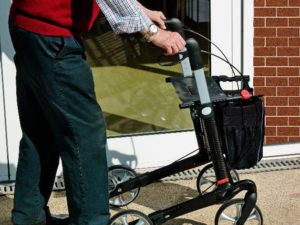 Medical alert systems or personal emergency response systems (PERS), can provide increased independence for your loved ones and peace of mind for yourself as a caregiver. But how do you select the best one for your situation?
Medical alert systems or personal emergency response systems (PERS), can provide increased independence for your loved ones and peace of mind for yourself as a caregiver. But how do you select the best one for your situation?
With advances in technology, the range of options has grown from basic wearable devices with a button to contact a response center in the case of an emergency. They now can include multiple features such as fall detection, in-home health and well-being monitors, fitness trackers, and movement sensors. However, with all of these viable options, selecting one that works best has become a little more complicated.
 When selecting an alert system, you need to evaluate your loved one’s specific needs and abilities- now and how they could in the future. For example, an individual with dementia may not understand how to operate the system. Therefore, an automatic system with a fall detection may be the best option. Remember, it’s not too much to ask if any of these devices offer a free trial period so you and your loved one can see which one works best.
When selecting an alert system, you need to evaluate your loved one’s specific needs and abilities- now and how they could in the future. For example, an individual with dementia may not understand how to operate the system. Therefore, an automatic system with a fall detection may be the best option. Remember, it’s not too much to ask if any of these devices offer a free trial period so you and your loved one can see which one works best.
What you need the system to do
It’s important you understand the systems that are available to you and what they can provide for you and your loved one.
Call for help- Wearable devices with the capability to connect you to a live person or directly to emergency services.
Fall detection- One in three people over the age of 65 fall every year- this is a common reason for obtaining a medical alert system.
Medical monitoring- Tracks vitals and includes medication reminders.
GPS- If your loved one is still driving or relatively independent, this feature could provide a tremendous amount of peace of mind.
Activity monitoring- Tracks movement within the household if you have a loved one who tends to wander.
Daily check-in services- Depending on the system, this could be with a live person or electronically.
Fitness tracking- Built in step counters and tools that offer information to achieve a healthy lifestyle.
Home security monitoring- This includes fire, smoke and carbon monoxide.
Availability & Equipment
 Many national companies offer medical alert systems services, but they may not be available near you. Local companies are an option but another unique avenue to explore is home security companies as they are now beginning to offer these services. Beware of complicated pricing plans and hidden fees. Search for a company that does not charge extra for the activation and installation.
Many national companies offer medical alert systems services, but they may not be available near you. Local companies are an option but another unique avenue to explore is home security companies as they are now beginning to offer these services. Beware of complicated pricing plans and hidden fees. Search for a company that does not charge extra for the activation and installation.
Besides the cost and availability, you need to consider what equipment would suit your needs best. For instance, is it wearable? Is it waterproof? What’s the range and connectivity? And most importantly, how is the battery life? These are important questions for you to ask when inquiring about a specific alert system. Once you have narrowed it down to a couple of options you must take into consideration the response time if there was an incident.
When it is all said and done and you have selected a system, remember to monitor it. You want to be sure it’s working out well for your loved ones. Don’t hesitate to switch to another service if it isn’t a perfect fit- it could save a life.